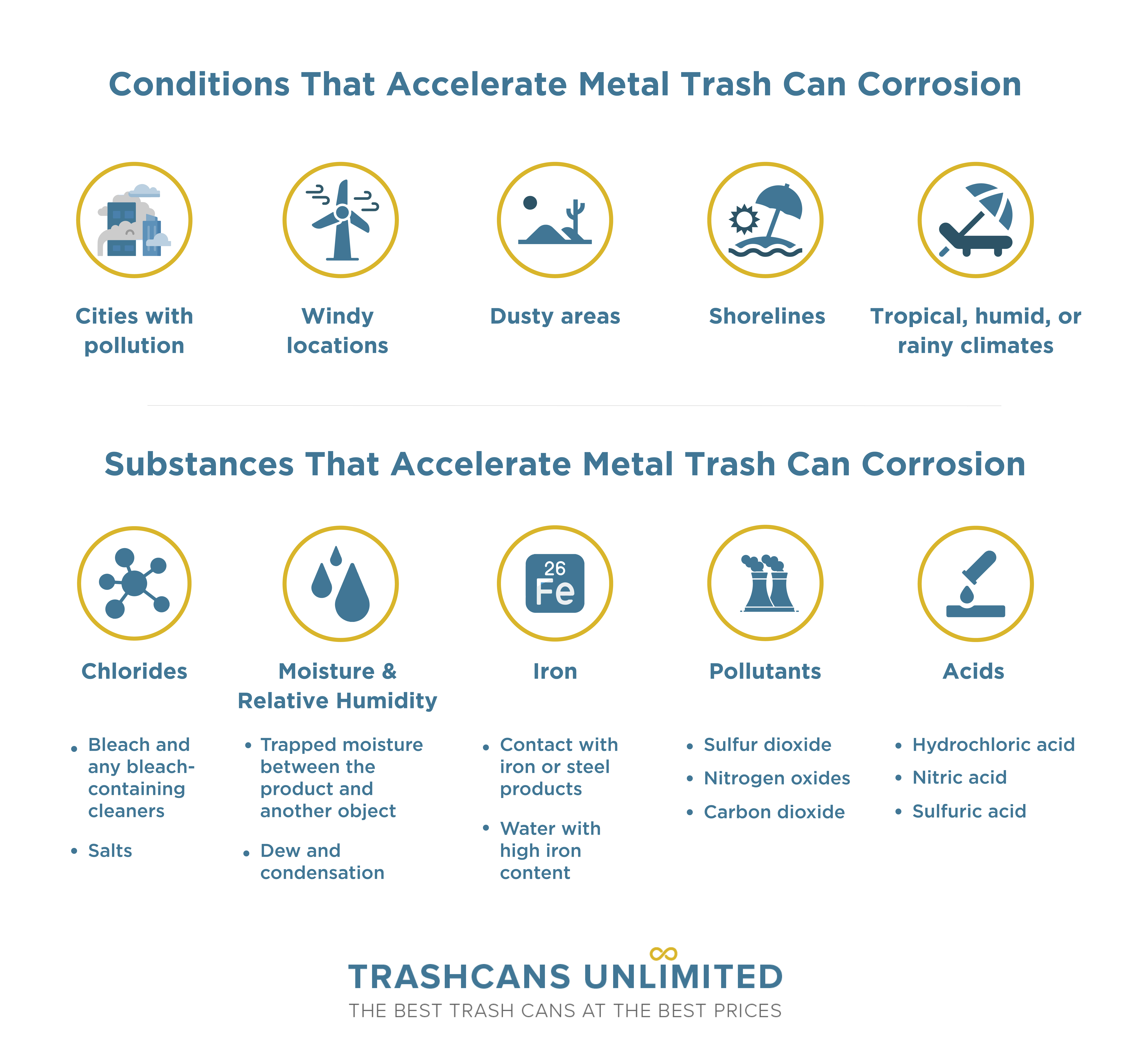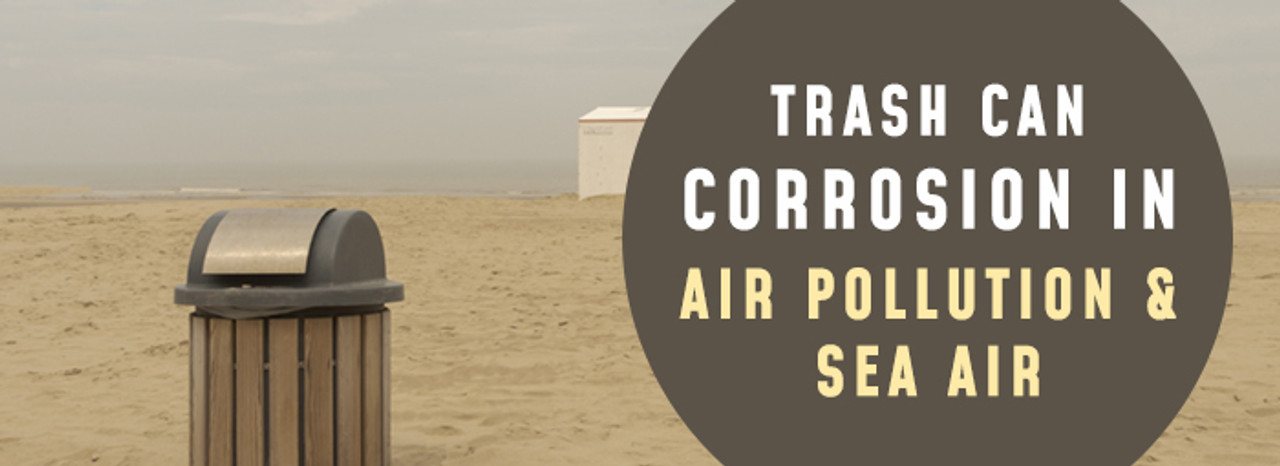The environment your trash can is stored in can often be even more important to the longevity of the can than what’s thrown away in it. Humid, salty, and polluted air causes wood and concrete to deteriorate, and metals to corrode and rust faster than air with less salt, humidity, and pollution. This is known as atmospheric corrosion, and it applies to metal trash cans as well. In this post, we’ll take you through how corrosion happens, and how to best protect against it.
What is corrosion?
Corrosion is a chemical reaction in which metal deteriorates over time. Metal corrodes when it comes into contact with another substance such as oxygen, hydrogen, an electrical current, or dirt and bacteria. Atmospheric corrosion takes place in the presence of electrolytes, such as humid and wet conditions. Atmospheric corrosion can be classified as dry corrosion, damp corrosion, and wet corrosion, as a result of the climate and weather conditions. Weather may be defined as the total of atmospheric conditions at a given place and time, such as temperature and humidity.

4 Conditions that Accelerate Trash Can Corrosion
Corrosion can occur in a number of conditions as a result of contact with a number of substances:
1. Humidity & Moisture
How does humidity affect or cause corrosion? Well, metal corrodes at a much greater rate under humid conditions. This happens because the moisture-saturated air reacts with oxygen and electrons on the surface of the metal. The longer metal components are exposed to humid air, the faster they will generally corrode.
2. Temperature
Temperature can be an agent in corrosive activity as well. With every 50 degree increase, corrosion activity doubles. Metal objects also experience what’s called “temperature lag” which is a result of their heat absorption relative to ambient temperature changes.
Temperature can also modify the dew point, which is the evaporation and condensation equilibrium for metal. If garbage cans aren’t stored in an area roughly comparable to the dew point, or if the dew point is exceeded rapidly by temperature changes, more corrosion might happen.
3. Sea Air
Aerosols and particulates distributed in the air also cause serious corrosion. In coastal areas, the chloride in sea spray, rain and dry salt and silica particles that the wind carries can contribute to the corrosion of metals, wood, and concrete. Often, this is the case for any area that’s within 10 miles of saltwater. Wind dust and sea spray are common aerosols, and if your metal garbage cans are around these, they’re much more likely to corrode faster.
4. Air Pollution
The presence of pollutants is another common cause of corrosion. They’re often produced by chemical processes in the atmosphere, so in many ways, they’re unavoidable. Sulfur dioxide, nitric and sulfuric acid, and nitrogen oxides are all common pollutants that interact with metal and can create corrosion in your garbage cans.
If that all sounds like a bit of jargon to you, know that many of these chemicals are found in vehicle fumes and often react with UV light, creating aerosols, the most common of which is haze. Fuel combustion around metal will often discolor or change the durability of metal, especially if that fuel is gasoline, diesel fuel, natural gas, or sulfur. In other words, urban and industrial environments like cities have more air pollution that can corrode metal trash cans.
3 Tips to Protect Your Trash Cans from Corrosion
There are dozens of ways to care for trash cans, and at Trashcans Unlimited, we have the products and the expertise to help you out. We have robust stainless steel cans with maintenance guidelines to help out, as well as guides to maintain concrete and commercial trash cans too.
There are numerous ways to care for your trash cans and protect them from corrosion, but these are some tried and true methods that will make sure you avoid most problems.
1. Store Trash Cans Indoors
The easiest way to protect your trash cans is by storing them indoors. Whether that’s inside, behind a covering, or next to a building under a roof, that will help save you a lot of grief.
2. Cover Outdoor Trash Cans
"Outdoors" can mean many different things, so narrow down your outdoor conditions to make sure your receptacles can handle them. In addition to the climate, the following factors are important:
- Overhead coverings - Overhead coverings come in many shapes and sizes, and the ultimate question is twofold: can the covering protect the area, and is it at risk of being blown away?
- Exposure to wind and projectiles - Will your trash can be in the middle of open space, or can you depend on trees and buildings to block gusts of wind? If your item will experience severe inclement weather then you'll need to find a trash can with the right kind of lid and the appropriate weight.
- Nearby fences — Can you depend on a security fence to keep your cans secure? If not then you'll need to get an item that is difficult to vandalize and/or move or just an item that you can secure fairly easily. Making sure that a can is secure is of primary importance to any storage solution.
3. Use Protective Coatings for Trash Cans
A protective coating can help your stainless steel fight the sea breeze. Before applying any coating, make sure that you sand away any rust build-up with fine sandpaper. After that, you’ll want to prepare the surface using a mild detergent or white vinegar.
As far as the coating itself, clear coats and paints are an excellent place to start, and can be applied with a brush, spray can, or roller. Make sure you follow the directions or instructions carefully when applying the coating.
Or, you can get a trash can that already comes with a protective plastic coating or Metal Armor coating. If you do so, make sure to consider the local climate — how hot, cold, humid, and/or windy does it get throughout the year? You'll need to find an outdoor trash can that is tough enough to stand up to the weather in your local area, whatever that might be.
Trash Cans that Survive Air Pollution & Sea Air
There are many materials that are built to survive the elements, but the most common ones for trash cans are metals and plastics. Metal is corroded by sea air and pollution. In most cases, you’re not going to have tons of problems with trash cans that are metal, especially if they’re one with a protective coating such as this trash can with Metal-Armor coating.
Acetal and many other plastics are great materials for use in environments with atmospheric corrosion, such as by the ocean and in cities. Plastic comes in different varieties, such as PVC, fiberglass, urethanes and polyurethanes, which are durable in sea air and around cities.
For cities and ocean climates, we recommend plastic trash cans, fiberglass trash cans, plastic coated trash cans, or trash cans like this one with a high density polyurethane rigid plastic liner to to withstand multiple conditions.
Trashcans Unlimited for The Trash Cans You Need
If your trash cans are beyond repair and it’s time to replace them, Trashcans Unlimited has the best trash cans at the best prices. We have everything from concrete to commercial grade trash cans, as well as custom logo or fiberglass cans. Our friendly and knowledgeable staff is ready to assist, and you can start browsing products right away.

